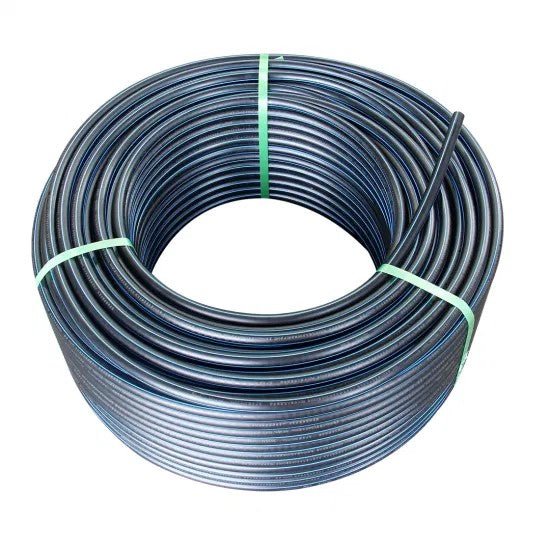Where to Find hdpe pipe in stock Midland TX for Urgent Projects
Understanding the Key Conveniences of HDPE Pipe for Water and Wastewater Management
Making use of HDPE pipe in water and wastewater management presents numerous advantages that warrant factor to consider. Its outstanding longevity and lengthy life-span make it a favored option for numerous projects. Additionally, the material's resistance to deterioration and chemical damages boosts its integrity in numerous settings. Nevertheless, the advantages expand beyond just longevity and resistance. Discovering its cost-effectiveness and environmental effect exposes also extra engaging factors for its prevalent fostering in modern-day facilities
Outstanding Resilience and Long Life

HDPE pipe stands out for its phenomenal longevity and longevity, making it a recommended choice in water administration systems. Created from high-density polyethylene, these pipes can endure considerable pressure and anxiety, making sure reliable performance with time. Their robust nature enables them to withstand severe environmental problems, including temperature level changes and dirt motions, which can create other products to fail.
The life-span of HDPE pipelines commonly exceeds 50 years, giving a cost-efficient remedy for towns and markets alike. Furthermore, the material's lightweight residential or commercial properties simplify installation, decreasing labor expenses and timeframes. This resilience reduces the need for frequent repair work or replacements, even more improving its economic appeal.
In water management applications, the reliability of HDPE pipes means less interruptions and improved service connection, making them indispensable to sustainable infrastructure development. The mix of longevity and long life strengthens HDPE's duty as a keystone in efficient water management services.

Resistance to Corrosion and Chemical Damage
While several products catch deterioration and chemical damage with time, HDPE pipes show remarkable resistance, making them suitable for various water monitoring applications. This strength originates from the molecular structure of high-density polyethylene, which is inherently non-reactive and does not corrode like steels or break down from direct exposure to extreme chemicals. Consequently, HDPE is extremely efficient in atmospheres with hostile substances, such as wastewater systems that may include acids, bases, and organic solvents.
Furthermore, HDPE pipelines can endure ecological elements such as soil level of acidity and saline conditions, even more enhancing their viability for diverse applications (Pipe Manufacturing Midland TX). Their capacity to preserve architectural integrity in time reduces the danger of leaks and failures, which is essential in making sure the security and reliability of water distribution and wastewater management systems. The resistance to corrosion and chemical damage markedly contributes to the overall effectiveness and longevity of HDPE piping services.
Cost-Effectiveness and Economic Advantages
When considering the financial ramifications of water administration systems, the cost-effectiveness of HDPE pipes becomes evident. These pipelines supply reduced setup and maintenance prices contrasted to typical products like metal or concrete. Their lightweight nature simplifies transport and setup, leading to decreased labor costs. Furthermore, HDPE pipelines exhibit a long life-span, usually surpassing 50 years, which converts to fewer substitutes and long-lasting savings.
Furthermore, the resistance of HDPE to rust and chemical damage decreases the requirement for pricey repair services and replacements. The pipelines also sustain efficient water circulation, reducing energy prices related to pumping systems. By reducing leaks and water loss, HDPE pipelines contribute to substantial financial benefits for municipalities and sectors alike. In general, the initial investment in HDPE piping can yield significant financial returns over the life-span of the water monitoring system, making it a sensible selection for lasting framework development.
Ecological Sustainability and Decreased Influence

Versatility and Adaptability in Installation
As a result of their unique properties, HDPE pipes use amazing convenience and adaptability in installment, making them appropriate for a large range of applications. Their light-weight nature permits for much easier handling and transportation, reducing labor prices and setup time. HDPE pipes can be bent and shaped to fit numerous terrains and project needs, which is especially useful in challenging settings.
Furthermore, their resistance to corrosion and chemical damages enables for installation in varied settings without the need for specialized safety coatings. The ability to fuse joints creates a constant, leak-free system, improving the overall honesty and dependability of the installation. HDPE's adaptability likewise suits ground motion, decreasing the threat of damage in locations susceptible to shifting dirt. Generally, these qualities make HDPE pipes not just flexible a knockout post yet also a favored useful reference selection for water and wastewater management systems.
Often Asked Inquiries
Exactly How Does HDPE Pipe Contrast to PVC in Water Monitoring Applications?
HDPE pipeline uses premium adaptability, resistance to rust, and resilience compared to PVC. Its lighter weight promotes less complicated setup, while its lengthy life-span lowers replacement prices, making HDPE a recommended choice in water administration applications.
What Is the Life-span of HDPE Pipes Under Normal Problems?
Under common problems, HDPE pipelines can have a lifespan varying from 50 to 100 years. Their resilience and resistance to deterioration contribute to their lasting efficiency in different applications, making them a trustworthy choice for facilities.
Are HDPE Pipeline Recyclable After Their Life Span?
Yes, HDPE pipes are recyclable after their life span. custom hdpe pipe manufacturing Midland TX. They can be refined and repurposed into new products, greatly reducing ecological influence and advertising sustainability within the market, making them a green option for piping options
What Is the Setup Process for HDPE Piping?
The setup process for HDPE pipes entails website preparation, trenching, pipe combination or mechanical joining, backfilling, and stress testing. Correct strategies guarantee a resilient and reliable system for carrying water and wastewater properly.
Can HDPE Pipeline Be Used for Both Safe And Clean and Non-Potable Water Solutions?
Yes, HDPE pipelines can be utilized for both safe and clean and non-potable water systems. Their versatility, durability, and resistance to rust make them suitable for different applications, ensuring risk-free and efficient transport of water in various contexts.